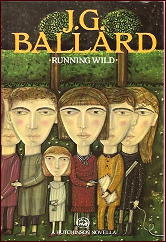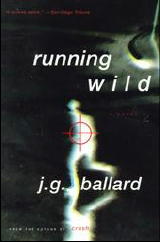Wed 9 Dec 2009
A Review by David L. Vineyard: J. G. BALLARD – Running Wild.
Posted by Steve under Reviews[11] Comments
J. G. BALLARD – Running Wild. Hutchinson, UK, hardcover, 1988. Farrar Straus Giroux, US, hc, 1989; trade ppbk, April 1999.

J.G. Ballard might be called science fiction’s poet of the apocalypse. His stunning early science fiction novels, The Wind From Nowhere, The Drowned World, The Drought, and The Crystal World were like nothing anyone else had written and nothing readers had encountered.
He had taken the Wellsian science fiction novel as practiced by John Wyndham and John Christopher and carried it about as far as it could go.
He followed that with stunning novels that have no real genre but their own, Concrete Island, High Rise, and Crash among them.
Running Wild was his first crime novel, and as stunning and apocalyptic as his science fiction. The book is a mere 88 pages long and should not be difficult to find.
Shortly after 8 o’clock in the morning on June 25th, 1988 the “Pangbourne Massacre,” as it came to be known in the press, took place. All 32 adult residents of the exclusive gated community just West of London were murdered, and the children have gone missing, presumed abducted. Is it a work of a madman, terrorism, or something worse?
Dr. Richard Greville the Deputy Psychiatric Advisor to the Metropolitan Police is called in to lead the investigation, but what he uncovers is at first more puzzling than the crime itself and gradually too horrible to face:
Ballard’s protagonist investigates the crime and begins to dissect it with care as the horrible truth begins to dawn on him. Like Stevenson’s Strange Case of Dr. Jekyll and Mr. Hyde, Running Wild is the rare mystery where the solution is more horrible than the crime itself.

Told in a cool clinical style, the short novel build to a tremendous power. Even once you start to grasp the truth, you may, like the officials at the end of the novel, reject it as just too horrible to face.
Perhaps one line of the novel sums up Ballard’s theme and his point:
Edgar Allan Poe said something very like that when he observed that madness might be the highest form of sanity. Like Poe, Ballard has written a work about the dark corners of the human psyche, and the evil men do with the best of motives and in the name of the greatest kindness.
Before his recent death Ballard wrote at least two more crime novels , Cocaine Nights and Super-Cannes. Both are superior works, but neither is the stunner this one is.
Few horror novels can claim to have the impact of this compellingly clinical novel about an unthinkable crime, one that has been all too prescient in light of terrors in our own modern world.
The frights of Ballard’s short novel are more potent than any witches, werewolves, or vampires — they are the everyday terrors that are the all too real stuff of the nightly news.
December 9th, 2009 at 6:45 pm
I love the work of J.G. Ballard and have read and reread most of his stories several times. Looking at the big volume collecting most of his short stories makes me think I have to reread them again. I’m hoping there is a novel still to be published even though Ballard is no longer with us.
December 9th, 2009 at 6:57 pm
The Complete Stories of J. G. Ballard came out in hardcover about three months ago. It’s over 1200 pages long and contains almost 100 stories. At Amazon’s discounted price of $23 and change, it’s a bargain. (List $35).
— Steve
December 9th, 2009 at 6:59 pm
Walker
Re the hope of one last book, me too. Fortunately he was fairly prolific, but a new Ballard would be a nice surprise. He’s one of the few writers who continued to surprise even late in his career, with both Cocaine Nights and Super Cannes something different and yet well within the classic lines of his work. His Day of Creation is in many ways as stunning as Conrad’s Heart of Darkness, and both Concrete Island and High Rise more frightening than fully 90% of what passes for horror fiction.
December 9th, 2009 at 7:14 pm
Running Wild is one of Ballard’s finest works. It shows his pure story telling gifts at their height.
I’ve read all of Ballard’s earlier short story collections, but haven’t seen the new giant Complete Stories yet. Many of the tales are masterpieces of science fiction.
December 10th, 2009 at 7:36 am
Great, just what I need. Another 1200 page book to read.
😉
Sounds too good to pass up, actually.
December 10th, 2009 at 9:11 am
I read these Ballard stories s-l-o-w-l-y, over a period of a decade or more. Have no idea what it would be like to try to sit down and read them all at once!
The best is probably “The Voices of Time”. Also notable: “The Waiting Grounds”, “The Cloud Sculptors of Coral D”. These could give one a taste of Ballard.
Looked at the table of contents on-line yesterday. The book has six “new” stories I haven’t read before.
This would be an ideal book for public libraries. It would give everyone access to Ballard’s short tales. Which are probably more important than his novels.
December 10th, 2009 at 11:13 am
Mike
You may well be right about the import of Ballard’s shorts, but I have to confess I always thought of him as a novelist first. And to be honest I haven’t ranked him as a science fiction novelist or just an sf guy since at least Crash. For my money he was a mainstream novelist at the very least since Day of Creation.
December 10th, 2009 at 11:57 am
David,
The short stories are far more consistently sf than the novels.
You are right, from Crash on, most of Ballard’s novels are more mainstream, with Hello America an important sf exception.
By the way, Running Wild is too short to be a “real” novel. It is actually a novella, and belongs with Ballard’s short fiction – although it is not reprinted in the Complete Stories. It’s a key example of Ballard’s total mastery of the short form.
Ballard often seemed the classic example of the “great short story writer who was forced to turn out novels to placate the literary establishment”. Although there are important things in The Drowned World/Burning World/Crystal World trilogy, Hello America and Empire of the Sun.
December 10th, 2009 at 12:37 pm
Mike,
I agree about Running Wild, but since it was published in a stand alone paperback I went ahead and called it a novel. As you well know the distinction of what exactly a novella or novelette is can depend on the writer and or editor involved. My own definition — which is strictly for personal use — is that 10,000 to 25,000 words is a novelette while 25,000 to under 50,000 a novella. 50,000 up is novel country.
But as I said that is strictly for my own use.
I actually think that the novella may be the best form for most popular literature. There is room for plot and character development, action and well written passages, but the author can avoid padding and other pitfalls of the novel. That said, since there is virtually no market for the novella writing one is an act of faith unless you have a story pre-sold.
Sadly many great novellas that appeared in the pulps and slicks in the past will never be reprinted because of their length. Luckily in some cases, like that of Rex Stout, he found away to keep at least the Wolfe novellas in the public eye, but most writers never had that option.
A few years ago there was an attemtp to do a series reprinting novellas in the mystery genre, but sadly that folded after only a few volumes. Nowadays a novella is usually only a condensation of a novel or a large chunk of one designed to whet the reader’s appetite, rather than an art form in itself.
December 10th, 2009 at 1:28 pm
David,
Hear, hear!
I totally agree with you about novellas. They are the ideal length for mysteries and sf.
Few things would improve US mystery fiction more, than a government law saying 50% of all mystery books had to be Stout-like collections of 3 or 4 novellas, instead of novels. Most writers, one suspect, would breathe a big sigh of relief.
Authors have no idea how to pad their books into the 300 page behemoths publishers demand. One recent private eye novel has nearly half a page describing the mailman’s Hawaiian shirt (no, it has nothing to do with the plot).
December 10th, 2009 at 1:58 pm
Though Ballard’s novels are excellent, I would have to say many of the short stories are even better. In fact when I first discovered his short work in the 1960’s, I even subscribed to the British SF magazines, NEW WORLDS and SCIENCE FANTASY. I figured any magazine smart enough to encourage Ballard must be good.